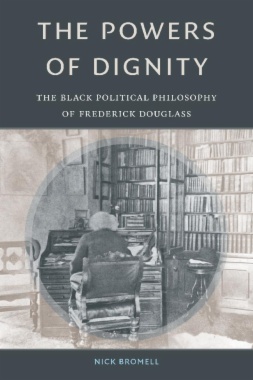In The Powers of Dignity Nick Bromell unpacks Frederick Douglass's 1867 claim that he had “elaborated a political philosophy” from his own “slave experience.” Bromell shows that Douglass devised his philosophy because he found that antebellum Americans' liberal-republican understanding of democracy did not provide a sufficient principled basis on which to fight anti-Black racism. To remedy this deficiency, Douglass deployed insights from his distinctively Black experience and developed a Black philosophy of democracy. He began by contesting the founders' racist assumptions about humanity and advancing instead a more robust theory of “the human” as a collection of human “powers.” He asserted further that the conscious exercise of those powers is what confirms human dignity and that human rights and democracy come into being as ways to affirm and protect that dignity. Thus, by emphasizing the powers and the dignity of all citizens, deriving democratic rights from these, and promoting a remarkably activist, power-oriented model of citizenship, Douglass's Black political philosophy aimed to rectify two major failings of US democracy in his time and ours: its complacence and its racism.
- Cover
- Contents
- Acknowledgments
- Introduction · “The Thing Looked Absurd”: The Black in Douglass’s Political Philosophy
- Chapter One. “To Become a Colored Man”: Proposing Black Powers to the Black Public Sphere
- Chapter Two. “A Chapter of Political Philosophy Applicable to the American People”: Human Nature, Human Dignity, Human Rights
- Chapter Three. “One Method for Expressing Opposite Emotions”: Douglass’s Fugitive Rhetoric
- Chapter Four. “Assault Compels Defense”: Douglass on Black Emigration and Violence
- Chapter Five. “A Living Root, Not a Twig Broken Off”: Douglass’s Constitutionalism and the Paradox of Democracy’s Foundations
- Chapter Six. “Somebody’s Child”: Awakening, Resistance, and Vulnerability in My Bondage and My Freedom
- Chapter Seven. “Nothing Less than a Radical Revolution”: Douglass’s Struggle for a Democracy without Race
- Chapter Eight. “That Strange, Mysterious, and Indescribable”: The Fugitive Legacy of Douglass’s Political Thought
- Notes
- Bibliography
- Index
- A
- B
- C
- D
- E
- F
- G
- H
- I
- J
- K
- L
- M
- N
- O
- P
- Q
- R
- S
- T
- U
- V
- W
- X
- Y

